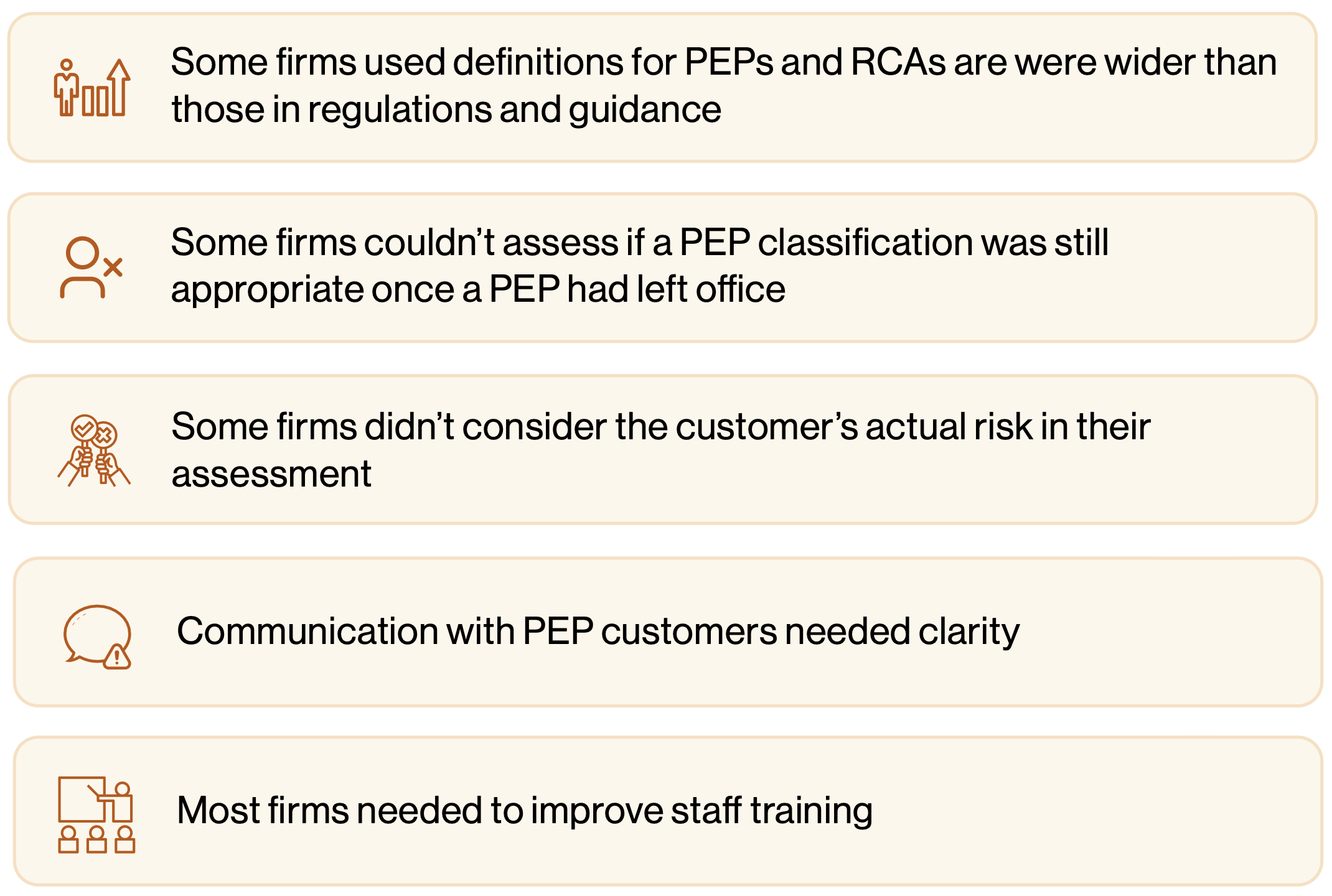Insight
In case you missed it, the FCA issued Finalised Guidance FG25/3 in July, following months of consultation in 2024. PEPs (Politically Exposed Persons) have always been a tricky issue for anti-money laundering efforts; anyone in the industry for long enough will have felt the frustration of the ‘Are they a PEP… or not?’ conversations, while fulfilling requirements with great care.

FATF Recommendation 12 (issued in 2013) requires financial institutions to identify PEPs (people holding a ‘prominent public function’), obtain senior management approval for establish or maintaining PEP customers, establish source of funds and wealth and conduct EDD. The FATF has noted that ‘prominent public function’ is not an objective measure and that member states should provide further guidance for regulated entities.
That guidance is hard to deliver! For example, if we focus too tightly on very powerful people like Members of Parliament, we may be missing a beat, because their clerks, assistants and advisors are very close to power. Equally, if we were to count every person who works for an MP as a PEP— well, we’d be here all night.
The FCA first announced that it would review financial institutions’ treatment of PEPs in September 2024, in response to the de-banking of Nigel Farage at Coutts. The FCA reviewed the treatment of PEPs by banks and found that most firms didn’t operate excessive or disproportionate checks, but that


The regulator then suggested a series of changes to guidance and opened a consultation for feedback on these changes before committing to them, and in July, the results of that consultation were made public. The FCA received 26 written responses and ran two roundtables. The feedback from all of this has resulted in a few changes to the FCA Guidance:
This is all helpful of course and should enable firms to apply a risk-based approach with more confidence, but there are still some challenges which firms will need to navigate. The guidance still notes that the definition of ‘prominent public function’ will vary according to the nature of the function a person holds, which means ‘Are they a PEP… or not?’ is still likely to occur. This is not necessarily a bad thing, because firms should have a strong awareness of what specific job potential PEPs are doing, as opposed to knowing just a vague title.
While legal entities should not be treated as PEPs unless a PEP has significant
control, the subjective nature of both PEPs and ‘significant control’ means this remains a tough order, needing best in class KYB and KYC working together to ensure we fully understand our business and institutional customers, how they operate and who’s in charge.
One respondent to the review raised the point that Non-Executive Directors may in fact hold a lot of power in a civil service function. It is likely to be harder to assess via public sources what exactly someone in these positions might be responsible for, setting a high expectation for good customer communications and relationships that allow honest and useful information to flow.
While domestic PEPs are considered lower risk, firms also can’t rest on their laurels and assume this is always the case in fact. The UK is as susceptible as any other country to home-grown corruption and firms will still need to be watchful and mindful of additional risk factors which might indicate that EDD would be a useful follow up.
The regulator received challenge that immediate declassification of PEPs is a disproportionate use of screening but was not moved by this argument. Where firms might previously have considered that EDD refresh events are sufficient time to declassify, the regulator felt that trigger events like elections should be closely monitored and that firms should speak to their customers more to keep records updated.
Updated guidance doesn’t fix all issues. While the guidance has added clarity about some PEP roles and expectations, risk assessments and monitoring, it arguably demands that firms know their PEPs better than ever in order to best assess them from a risk-based approach. The guidance may mean that your firm needs changes to operational processes and training as well as escalation paths and sign offs, as well as establishing an approach to declassifying that allows for speedy action.
DCM has lots of experience updating PEP journeys and escalation, so if you need support standing up new functions, improving what already exists efficiently and quickly, or clearing down a backlog, give us a call to hear our ideas on how we can help.
FATF Recommendations 12, 22 - Explore reference
FCA July 2024 Review - Explore reference
FCA July 2025 Guidance Update - Explore reference
For more information on all our services please get in touch here.